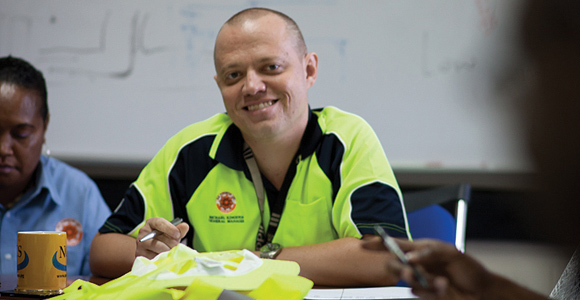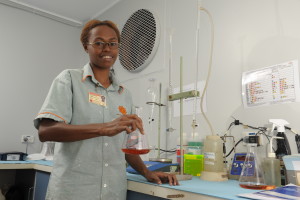For the last 18 months, leading Lae manufacturer K K Kingston has been consolidating and restructuring. Chief Executive Officer Michael Kingston talks to Business Advantage PNG about the company’s strategy, his optimism for the future, and the issues facing businesses in Papua New Guinea.

K K Kingston’s Michael Kingston
Business Advantage PNG (BAPNG): What are the key challenges facing K K Kingston in 2015/2016?
Michael Kingston (MK): We’re probably facing the same challenges that all businesses in PNG are facing.
The economy is obviously much more subdued that we’ve become accustomed to and this will continue into 2016. There is not a lot of new mining or LNG projects under construction yet.
I think everyone is hoping that the Total LNG project will go ahead, and we all wait for the day that Wafi-Golpu begins construction.
It is sad to see that the coffee harvest this year is again poor, both in terms of yield and in terms of price.
I applaud the government of PNG for the investments they have made in ports, roads and other much needed pieces of infrastructure. Government spending in 2015 has given the economy a much needed injection of stimulus. The concern for me is that running a large budget deficit is unsustainable.
K K Kingston is viewing this as a consolidation period to allow us to get ready for the next wave of high growth that will inevitably come with more mine and gas development. The question is not if the economy will improve but when. We intend to be ready when it happens.
The other concern is the foreign exchange issues currently affecting PNG.
It is increasingly difficult for businesses like K K Kingston to obtain foreign currency as and when we need it. Based on all the advice we’ve received, I do not believe this is going to get any better over the course of 2015.
I expect foreign exchange liquidity to continue to tighten, and the waiting list for FX orders to continue to grow. This liquidity crunch presents major challenges for every business operating in PNG.
BAPNG: What are the key issues you see for the economy in general?
MK: The lack of new mining development activity and lower prices for resources globally means that there is a lot less liquidity in the economy as a whole.
This is not limited to the mining and resource sector. The agricultural sector is also struggling with low outputs and low prices, most notably cocoa and coffee.
This will pass, and hopefully some time in 2016 we will see things heat up again.

Inside a K K Kingston laboratory. Credit: Rocky Roe
One of the great dangers that we face in PNG is becoming overly reliant on the resource sector, and creating a one dimensional economy. One could argue that this has already happened.
We need to create a diverse and vibrant economy where we have multiple industries that create employment and generate tax revenues for the state.
This diversity in turn creates a natural hedge for the economy. The resource sector alone cannot create enough employment opportunities for the entire PNG population.
The question is not if the economy will improve but when. We intend to be ready when it happens.
We also have the challenge presented by potentially unsustainable government spending. On one hand, it is great to see the government spending and investing in infrastructure and other areas that sorely need it.
I applaud the government of PNG for the investments they have made in ports, roads and other much needed pieces of infrastructure. Government spending in 2015 has given the economy a much needed injection of stimulus.
The concern for me is that running a large budget deficit is unsustainable.
I expect a supplementary budget to be released later in the year, and for this to have a greatly reduced level of state spending going forward.
It may appear that I seem overly negative about PNG’s economic outlook. I am not. I am actually very positive about PNG’s future prospects.
BAPNG: You returned to your core business during 2013 and consolidated that restructuring and rationalisation in 2014. How is the plan to consolidate all the Lae operations into your new Speedway site proceeding?
MK: In a word, slow!
We originally planned to take a ‘big bang’ approach, develop the whole site and move everything at once. But the upfront investment was somewhere between K50 million and K100 million, which is a huge amount of money for us.
The only logical thing to do was to develop it in a gradual manner, one building at a time, and fund it out of cash flow. This is the approach we’re taking.
We need to create a diverse and vibrant economy where we have multiple industries that create employment and generate tax revenues for the state.
We’ve already moved our container yard and raw materials storage out to Speedway, and the next step will be to build some workshops out there, and the step after that will be to build our finished goods warehouse.
Once the whole project is complete we will have about 12 buildings on the site and about 26,000 square metres of factory or warehouse space.
It will take us about five years to finish everything.
BAPNG: What new products has K K Kingston on the market in 2015?
MK: Quite a number of new products, and we’ve released a number of upgrades to existing products. For example we re-launched our Dazzle laundry detergent powder, which has a new formulation, new fragrance and upgraded packaging.
Once the whole project is complete we will have about 12 buildings on the site and about 26,000 square metres of factory or warehouse space. It will take us about five years to finish everything.
We released a kitchen towel product that we hope will compete with some of the imported kitchen towel products. We began supplying one of the major mines with bulk sulphuric acid—another new product for us. We are working to gain our cyanide certification so that we can supply sodium cyanide to the gold miners in PNG.
This year is also our rotomoulding year. We have about 12 new Tuffa products that we will progressively release over 2015.








Speak Your Mind